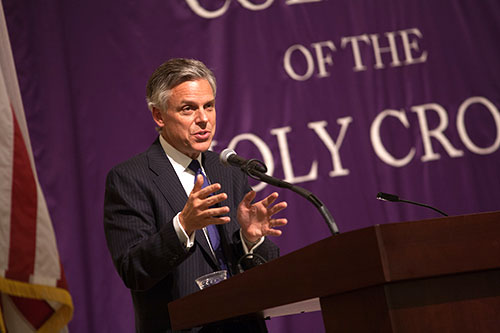Approximately 400 people filled the Hogan Campus Center Ballroom to hear former Utah governor and ambassador to China, Jon Huntsman Jr., deliver the 48th annual Hanify-Howland Memorial Lecture on Nov. 13. The Republican presidential candidate in the 2012 election primaries was invited to Holy Cross by the student-run Hanify-Howland Memorial Lecture Committee. Huntsman, who took many questions from the crowd following the talk, engaged in an hour-long seminar with 25 students before the lecture.
Huntsman's lecture focused equally on opportunities and struggles the United States has going forward to sustain its economic and political power status. He lambasted the extreme partisanship permeating national politics and how it has eroded the nation’s democracy. As one of the leaders of the “No Labels” citizens movement, comprised of Democrats, Republicans and others, he is seeking to promote an era of “new politics” focused on pragmatic problem solving and increased bi-partisanship.
The governor, spoke harshly about the influence that an increasing number of super PACs (political action committees) are having on political campaigns stemming from the Supreme Court ruling titled Citizens United v. Federal Election Commission. The ruling holds that it is as an infringement on free speech for caps to be placed on labor union and corporate donations to political campaigns. “You shouldn't be able to donate to a candidate you can't vote for,” he said.
Huntsman mentioned how the 2010 United States Census ushered in an era of hyper-partisan “gerrymandered” congressional districts, leading to greater than 70 percent of all federal elections being predictably Democrat or Republican. Due to this, general elections have become irrelevant and the competition has moved to the primaries, where ideological extremists on both sides have begun running against establishment candidates. This has caused a massive decline in moderate congressmen and shifted the party's representatives to the fringe, making compromise exceedingly difficult. Huntsman emphasized numerous times that “the U.S. doesn't work well at the extremes” and that an independent redistricting committee should be used, a body unbiased by politics and elections.
Despite highlighting dysfunction in Washington D.C. and government, Huntsman said the country faces great opportunities ahead. The U.S. is on pace to surpass Saudi Arabia as the largest producer of natural gas, and to become the global exporter of energy, he said. Unlike Europe and China, the cost of energy is dramatically cheaper in the U.S. Huntsman surmises that this will spur economic growth at home, create jobs and raise middle class incomes.
Furthermore, the revival of the American manufacturing industry, hit hard by outsourcing, is now producing and exporting goods from the U.S. to feed growing consumptive demand in Asia. The shift in the trade deficit from the U.S., which has consumed far more than its level of production toward Asia, will level the playing field for American manufacturers. Furthermore, the rise in commodities prices and oil will make U.S. production more cost effective, giving a much needed boost to America's beleaguered Rust Belt communities hard hit by industry offshoring in past decades.
“America has never had more areas of opportunity to grow prosperous than right now,” he said. Through compromise made by both political parties and common sense legislation supported by the majority of Americans, Huntsman argues America is on pace to be very competitive in the 21st century. 
Fmr. Presidential Candidate Jon Huntsman Calls for End to Ideological Partisanship
Read Time
2 Minutes








